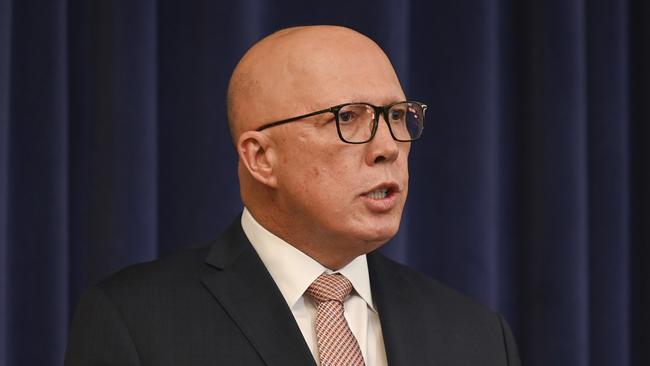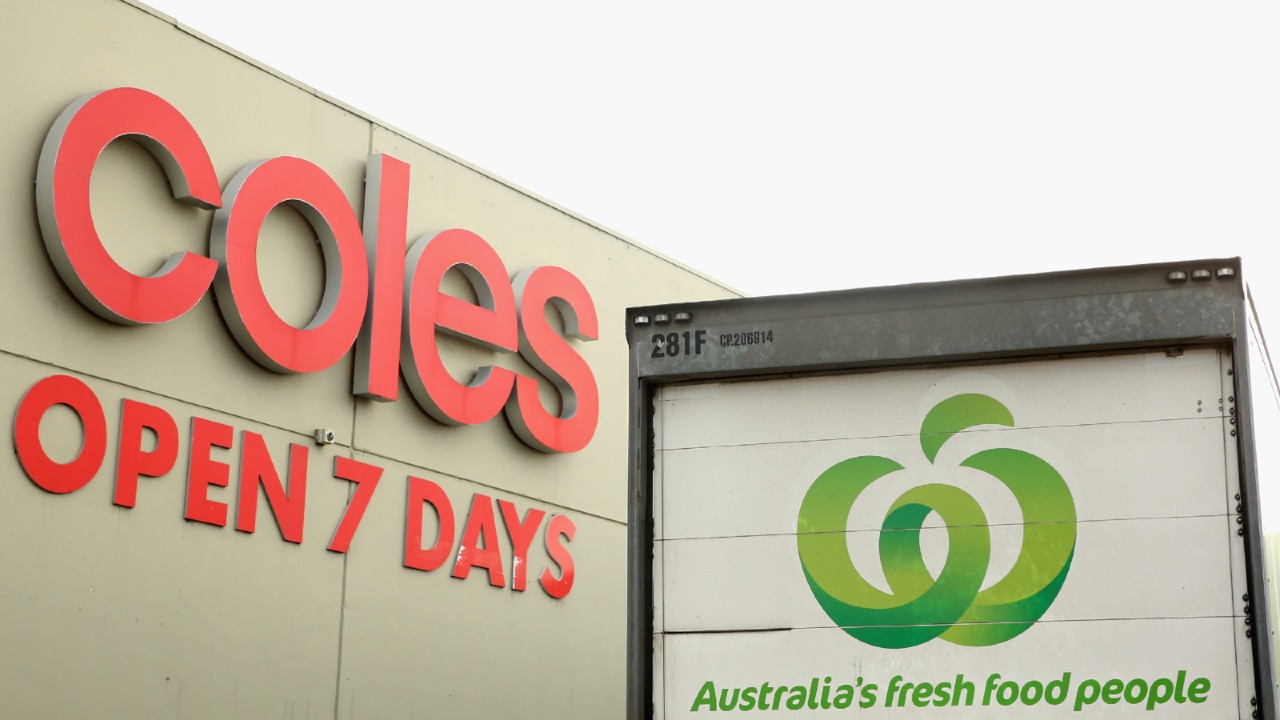Price check, Peter Dutton aisle, as Liberals split on big retailers break-up
The Coalition has split over Peter Dutton’s plan for new divestiture powers to break up major hardware and grocery retailers, with Liberal MPs saying they were ambushed over the policy.

The Coalition has split over Peter Dutton’s plan for new divestiture powers to break up major hardware and grocery retailers, with Liberal MPs saying they were ambushed over the policy and that the shake-up would force supermarket prices higher.
A debate over the policy in the Coalition joint party room lasted for up to an hour on Tuesday, with several opposition MP asking questions amid concerns it could be seen as a challenge to traditional Liberal values.
The Opposition Leader on Tuesday sought to open a new front in the cost-of-living debate and take the fight to Labor and big business by proposing the new divestiture power for major players in the supermarket and hardware sectors with turnover of more than $5bn a year.
Narrowly targeted to capture businesses such as Woolworths, Coles, Aldi and Metcash and subject to several safeguards, the policy is meant to serve as a deterrent against anti-competitive behaviour. It is intended to be used only rarely, with its existence serving as a “sword of Damocles” to help improve conduct in the sector.
Retailers exceeding the $5bn turnover threshold would also face infringement notices of up to $2m for contraventions of the food and grocery code. The maximum penalty of $10m for more harmful breaches – as recommended by Craig Emerson in his supermarket review – is endorsed under the Coalition plan.

The new regime would be enforced by a proposed “supermarket commissioner” charged with receiving complaints that could be provided to the Australian Competition & Consumer Commission.
The new divestiture powers are being proposed as a response to allegations of land banking, anti-competitive discounting and unfairly passing costs onto suppliers, but several Liberal MPs warned the policy could have the effect of pushing up prices going into an election fought on cost-of-living issues.
The Australian Retailers Association warned the proposal could increase grocery prices for consumers, with chief executive Paul Zahra saying large supermarkets operated with high fixed costs and intricate supply chains. He warned it would set a dangerous precedent if implemented.
“Australian business is not directly comparable to other regions due to its large geographic size – coupled with a relatively small population – which makes achieving economies of scale an ongoing challenge,” Mr Zahra said. “The ARA supports initiatives aimed at enhancing market competition, but divestiture is not a workable proposition.”
Opposition Treasury spokesman Angus Taylor, who largely devised the new policy, said on Tuesday it would be subject to key safeguards to ensure it would not cost jobs and services.
The Australian understands a range of Liberal MPs asked questions or expressed reservations and concerns about the policy in the Coalition joint party room, including Alex Hawke, Dave Sharma, Maria Kovacic, Rowan Ramsey and Keith Wolahan.
One Liberal source said it was the “biggest debate for years in the Liberal partyroom” while another said it was the “most lengthy and heated partyroom discussion this term”. Multiple Liberal MPs told The Australian they were worried the Liberals had embraced a Nationals policy and were now backing a position that had initially been championed by the Greens.
“There is real Liberal objection to it,” one MP said.
The Australian confirmed that Nationals Leader David Littleproud would seek to introduce the divestiture power in the form of a private member’s bill when the parliament returned after the winter break.
Business Council of Australia chief executive Bran Black said the last three independent competition reviews had all rejected divestiture powers. “The announced Coalition policy has more guardrails than the Greens policy,” he said. “However, experts who have looked at divestiture proposals recently found it would negatively impact consumers and jobs, and that remains our focus.”
Greens economic justice spokesman Nick McKim said Labor was now an isolated voice in the parliament, declaring that the Coalition’s support for divestiture powers in the supermarket sector made this “a moment of choice for Prime Minister Albanese”.
In parliament, Anthony Albanese accused Mr Taylor of “being rolled” on the divestiture policy, while Jim Chalmers said Mr Littleproud had “got his way over the wishes of so many others on that frontbench”.
One Liberal MP quipped that the party’s next step could be to propose a “big stick” for the banking sector, warning of an eventual return to the “managed economy of the early part of the 20th century.”
“Consumers will end up paying the costs of regulation,” said another.
Unveiling the policy, Mr Taylor said Australia was unusual because it had a highly concentrated grocery sector and lacked a “broad-ranging divestment power attached to the offences in our consumer and competition act”.
“In the US and the UK those powers are there,” Mr Taylor said. “What we are proposing to do is to have a balanced power within the consumer and competition act attached to section 46 – the misuse of market power clause … to make sure that consumers, farmers, (and) small businesses supplying our major grocery retailers and hardware retailers … to make sure they get a fair go,” he said.
Mr Taylor said it was critical to “get the balance right” and provided an assurance there were safeguards included in the policy.
“It is confined to supermarkets and hardware,” he said. “It will only be applied where divestment can lead to a substantial improvement in competition.”
“There must be a very real benefit that’s proven in a court and demonstrated will provide benefits to consumers, to small business, to farmers who are supplying those retailers,” he said.
“Finally, it must pass a public interest test. There’s been criticism … this could result in a loss of jobs or a significant loss of shareholder value. The public interest test ensures that that is not possible.”
Labor has opposed a forced divestiture power and, in his recent review of the food and grocery code of conduct, Dr Emerson, said it was “not a credible threat” to supermarkets. He told The Australian it was still the right move to oppose divestiture measures. “The Coalition has said it wouldn’t support (divestiture measures) if it involved job losses. But that’s the fear that it would,” Dr Emerson said.
“I had indicated in my report that I opposed it on the grounds that the threat of forced divestiture needed to be credible – and a judge would need to decide that this was the best remedy for the misuse of market power in preference to the huge penalties that I have recommended.
“The problem with that is they need to find a buyer for the stores that would be divested. If that were to be an Australian buyer, then it wouldn’t change market concentration and foreign buyers could come in anyway.”
Former ACCC chair Allan Fels said the Coalition policy was the first step towards a long overdue general divestiture power in competition law. He argued it should be expanded across the economy. “I applaud it,” Professor Fels said. “I believe, however, it should be applied to all big business – the same as in the US – with adequate safeguards.”
He said its existence would have a “powerful deterrent effective on big retailer behaviour.”
“Craig Emerson’s otherwise excellent work was marred by an uninformed reproduction of Coles and Woolworth’s spin,” Professor Fels said.
Other Liberal MPs backed in the policy, with Queensland Liberal MP Garth Hamilton – the deputy chair of the standing committee on economics – saying he had “led the charge within the Liberal Party” for the development of new divestiture powers for supermarkets.
“It’s important in an electorate like mine (Groom) with so many small local producers,” he said. “We need a big stick and coupled with competition policy this could be a great benefit to our economy. This will result in better outcomes for producers and customers.”
Victorian Liberal MP Aaron Violi said that, having worked in the sector for a decade, he had “experienced first hand the challenges of market concentration in the grocery sector.”
“This legislation strikes the right balance to support consumers, farmers and Australia’s food manufacturers.”





To join the conversation, please log in. Don't have an account? Register
Join the conversation, you are commenting as Logout